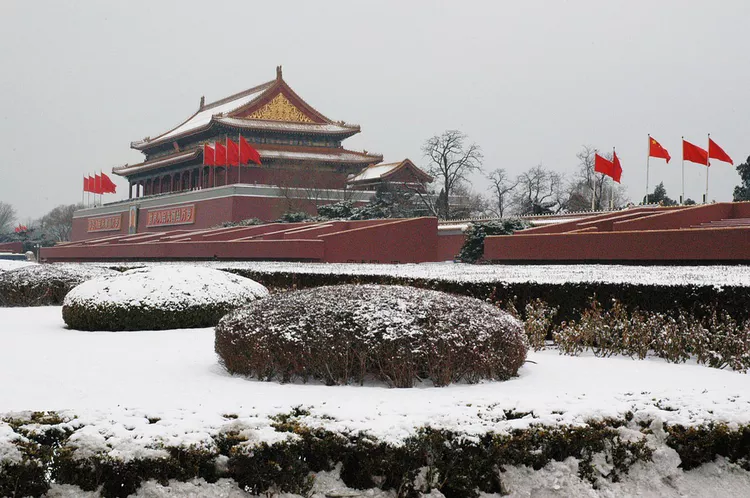Although not as cold as January, February in China is still quite chilly, yet this doesn’t deter the people from celebrating the annual Spring Festival in honor of the Chinese New Year, along with various other festive events and parties.
However, depending on your destination, the weather can vary throughout the month; while the north remains cold and dry, central China experiences milder and wetter weather, and southern China can be warm yet rainy. Fortunately, no matter where you visit in China, you’ll find plenty of activities and sights to enjoy.
China Weather in February
Thanks to China’s vast geographic expanse, weather conditions in February can drastically differ based on your travel location. While the northern regions regularly experience freezing temperatures, southern coastal areas may be warm enough for beach outings, even in February.
| City | Average High | Average Low | Days of Precipitation | Precipitation Total |
|---|---|---|---|---|
| Beijing | 41 F | 22 F | 2 | 0.2 inches |
| Shanghai | 46 F | 36 F | 7 | 1.7 inches |
| Guangzhou | 66 F | 54 F | 11 | 2.8 inches |
| Guilin | 55 F | 45 F | 16 | 3.8 inches |
| Chengdu | 52 F | 41 F | 9 | 0.5 inches |
What to Pack
During the winter months in China, it’s essential for travelers to pack multiple layers to ensure warmth and comfort. However, your packing list should be tailored based on the specific regions you’ll be visiting:
- North: In cities like Beijing, expect cold daytime temperatures and sub-zero nights. Long underwear, fleece jackets, and wind-proof or down jackets, along with sweaters, long pants, scarves, gloves, and a warm hat, will be crucial.
- Central: Cities like Chengdu and Shanghai are slightly warmer, though still chilly during the day and cool at night. A heavy base layer (jeans, boots, and sweaters) combined with a rain/wind-proof jacket should suffice. Don’t forget an umbrella and waterproof shoes, as rain is common.
- South: In places like Guangzhou, expect cool and rainy weather, significantly warmer than northern and central China. Long sleeves, pants, and a rain/wind-proof jacket will keep you comfortable.
February Events in China
From the Spring Festival, marking the Chinese New Year, to Valentine’s Day, February is bustling with events across China. However, as the date for the Chinese New Year shifts annually, festivities may not necessarily fall in February each year; thus, reviewing the Spring Festival calendar is advisable.
- Chinese New Year/Spring Festival: This 15-day celebration features fireworks, parades, lion dances, and other performances across cities, as well as traditional gatherings centered around food and family. While regional variations exist, most of China celebrates the Spring Festival similarly.
- Lantern Festival: This festival signifies the end of the Spring Festival and involves lighting and releasing thousands of paper lanterns into the night sky, honoring the new year and honoring loved ones. Following this event, traditional New Year taboos cease, and decorations across the country are taken down. The Lantern Festival corresponds with the first full moon of the Chinese New Year.
- Valentine’s Day: Similar to many parts of the world, Valentine’s Day is celebrated on February 14 in China, often involving gifts of chocolates and romantic gestures. Meanwhile, China also honors its unique love-centric holiday, the Qixi Festival, during the seventh day of the seventh month in the Lunar Calendar.
- Harbin Ice and Snow Festival: This popular winter celebration occurs in Harbin and features incredible ice sculptures crafted by global artists. While the festival officially concludes in the first week of February, many sculptures remain on display for weeks afterward.
February Travel Tips
- In northern China, dry weather in Beijing ensures pleasant sightseeing conditions, while central and southern China’s colder temperatures can still accommodate enjoyable tours if the appropriate layers are worn.
- Although February is typically considered off-peak for tourism, the Spring Festival draws many international travelers, leading to increased airfare and accommodation prices. If budget is a concern, consider scheduling your trip towards the end of the month when costs are likely to decrease.
- Since Chinese New Year lacks an official holiday, competition from locals for popular attractions may be minimal. However, the cold temperatures can make cross-country travel less appealing, even if international tourist numbers at local sites remain low.





